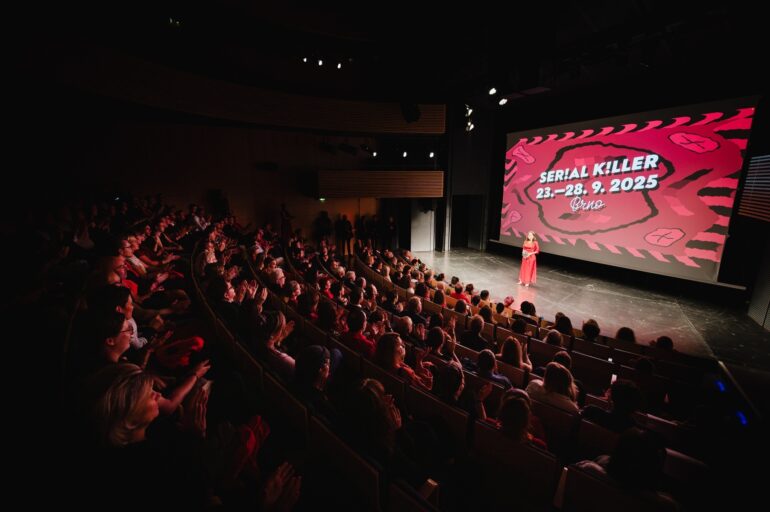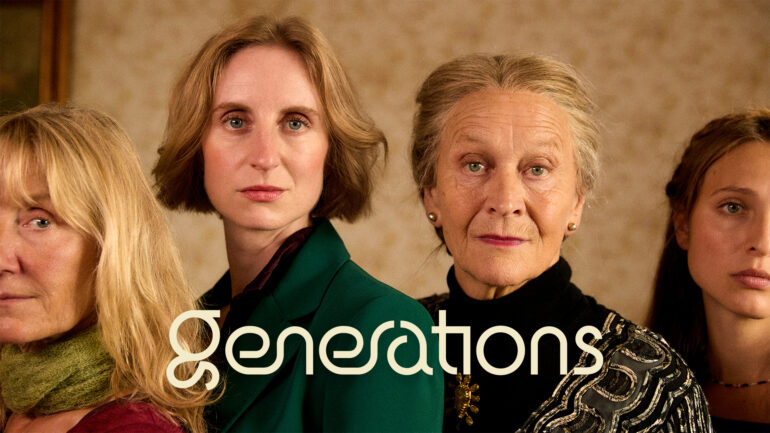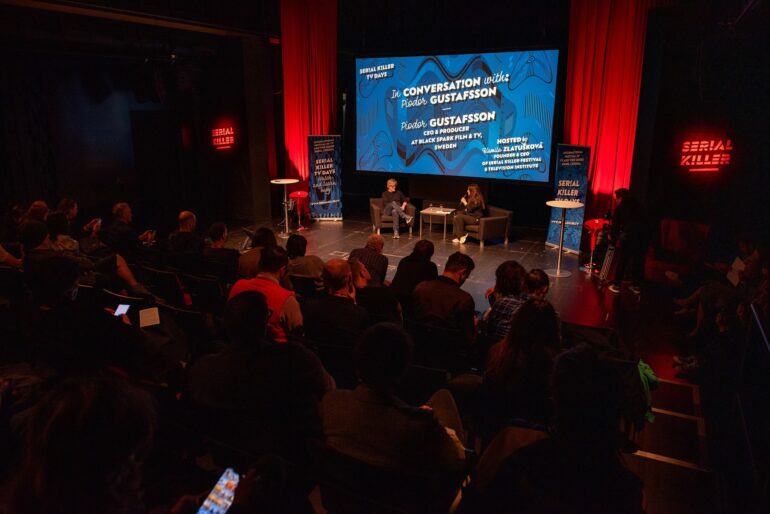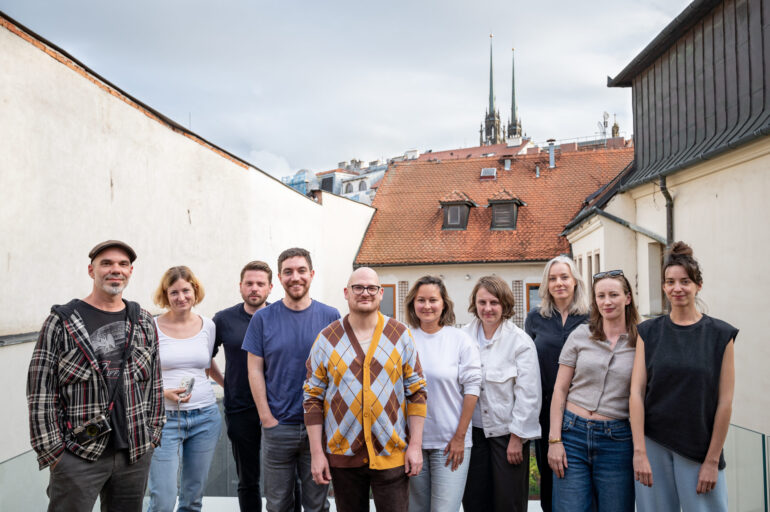WRITTEN BY: Davide Abbatescianni
“Speaking to and engaging with Gen Z is not optional,” the experts gathered in Brno said.
From 23 to 28 September, Brno hosted the latest edition of Serial Killer, the Central European industry event that has steadily grown into a hub for creative exchange, international co-productions, and a showcase of emerging trends in scripted television. This year, the festival shone a particular spotlight on Denmark, a country whose bold, character-driven narratives have made Danish drama a reference point across Europe.
The focus on Denmark featured five recent series, each highlighting a facet of contemporary Danish society, its cinematic traditions, and storytelling breadth. The line-up comprised the smash hit Carmen Curlers, Thomas Vinterberg’s acclaimed Families Like Ours (Familier som vores), Lone Scherfig’s gaze on Denmark’s top maternity ward The Shift (Dag & nat), the rebellious retro drama Bullshit, and the brand-new comedy-drama Generations (Generationer), which stood out for its nuanced take on family, memory, and intergenerational conflict.
The plot of Generations unfolds as a mummified infant is discovered during a renovation in Copenhagen, and 87-year-old Martha’s confession to having killed the child sets off a chain of events revealing buried family secrets. Told through multiple generations of women, the series combines humour and pathos to explore guilt, reconciliation, and the way trauma echoes across time. As writer-director Anna Emma Haudal explained during her case study session: “The story is about all the family and how they react to this. First of all, has she done it? Is she crazy? Does she need some attention?”
The show’s emphasis on authentic character development and generational trauma underscores a broader trend in Nordic drama: blending high-stakes narrative frameworks with intimate, human-centred storytelling. Haudal stressed the importance of character-driven storytelling over plot-first approaches. “We let the plot roll from the characters - so much about them and what comes from them. What we see captures the audience, because they love different characters and want to see what happens with them.”
In addition to the Danish showcase, the festival’s international panorama competition included three award-winning Nordic-Arctic productions: Pressure Point (Smärtpunkten), A Better Man (Ølhunden Berit), and A Sámi Wedding (Heajastallan – Bryllupsfesten).
The human element: filmmakers as AI catalysts
A major theme at this year’s festival was the intersection of technology and creative production. In a keynote titled “The Human Element: Why Filmmakers Are the Key to AI’s Future”, Daniel Lägersten, CEO of Gothenburg Film Studios, offered an optimistic yet measured view on the role of AI in storytelling.
“This is just the beginning. We’ll have these people as the most common financiers in the next five years - they’re looking for creators. I had meetings in Venice with investors representing tech giants. And they want to invest. The tech is making very difficult stuff that 10 years ago couldn’t be done or was very expensive,” he explained.
Lägersten’s thesis challenged prevailing fears of automation displacing creative talent. Instead, he argued, filmmakers and storytellers are the most valuable assets for AI’s success. “AI is not the solution for film production. It’s our expertise - our deep understanding of narrative, composition, and human emotion - that powers these tools,” he stated. He started out commenting on experimental projects, including Critterz, an OpenAI-backed film premiering at Cannes, and then focused on one of his students’ projects: a fully AI-generated three-minute clip exploring modern-time colonialism, illustrating the creative potential of combining human insight with technological innovation. “Imagine if a student working with one computer did this, what we can do as an industry with the creators we have,” he added.
He also compared AI’s qualities to those of Frankenstein. “The monster learns to live as if he were the first human, learning to understand the physical realities of earthly life such as human language - that’s what AI does. Like Frankenstein, it copies us; it’s not good at doing math, but really good at working the same way we do.”
For these reasons, AI is able to generate generic narratives but struggles with originality, “edginess,” and emotional nuance. He highlighted Another Persona, an AI-generated adaptation of Ingmar Bergman’s classic, featuring Alma Pöysti and screened at Göteborg earlier this year, as a proof-of-concept of how AI can mimic, but not replace, human creativity.
His final message was loud and clear: “The value of our competence has never been clearer. We’re not just users of these tools; we’re the essential partners whose knowledge will shape the future of audiovisual media.”
Sci-fi and budget realities: the making of We Come in Peace
Another highlight was the session “In Conversation with Peter ‘Piodor’ Gustafsson”, moderated by Serial Killer CEO Kamila Zlatušková. Gustafsson, a Swedish producer with over three decades of experience, discussed the making of TV4’s new sci-fi series We Come in Peace (Vi kommer i fred).
“Since we’ve been doing this for a big commercial station, they needed it to be both fascinating and relatable for the audience, combining a more sophisticated element - the aliens - with characters leading normal lives in the contemporary world, which is difficult to achieve,” Gustafsson said. “In essence, it’s a series about how we treat strangers and how we face the challenges of Mother Earth. They say they come in peace, but do they?”
The series, led by Fares Fares and Evin Ahmad, balances high-concept science fiction with relatable human stories, navigating the delicate boundary between spectacle and grounded drama.
Discussing development, Gustafsson revealed: “The creator of this series, Lars Lundström - I knew he could write something that also appeals to a bigger audience with that sort of safety, and I brought in as a director Jens Jonsson. He’s extremely experienced. Even with a bigger budget than a typical drama series, it remains very limited compared with US productions.”
International distribution is managed by Newen Connect, a subsidiary of the TF1 Group, while Nordic sales are taken care of by Black Spark Film & TV. “We had Frank Spotnitz on board as a script supervisor to make sure we had all the sci-fi storytelling elements in place,” he revealed. The six episodes form the first part of a three-season plan, with the ending of season 1 allowing for “a very natural continuation”.
Supporting Gen Z and Alpha: Yle’s approach
The event also explored strategies for nurturing emerging Nordic talent. Jarmo Lampela, Head of Drama at Finnish public broadcaster Yle, detailed how the network is restructuring its drama department to support creators of varying experience levels. Yle’s approach involves three “baskets”: contemporary and period drama; suspense/thriller; and comedy/feelgood content, alongside audio drama and digital-first series.
Lampela highlighted the challenge of balancing innovative storytelling with audience accessibility, noting that Yle reaches 92% of Finns weekly, with significant engagement among young adults through social media initiatives like Areena Stories. He also touched on the rich slate of productions, including youth-orientated shows such as The King of Social Media, Ciao My Love (co-produced with Italy’s Rai), Belzebubs (“an animated family sitcom with a satanic twist”), and Crème de la crème (“a series about two young guys entering the sperm business”).
Through moderated backing and medium-sized projects, Yle aims to give young creators the freedom to experiment while learning the craft of serial storytelling. “The next step is to standardise and increase resources for creators in their 20s and 30s, helping them translate their world and ideas into production-ready formats,” Lampela explained.
Some more takeaways
The “In the Crosshairs: Series Thrills in Development – Good Enough” session featured Marta Hopfer-Gilles and Jean-Nicolas Gilles Hopfer, the Norwegian creative duo behind the acclaimed R-rated dramedy Good Enough. The series follows Pola, a Polish expat in Oslo navigating perimenopause, step-parenting, and cultural identity. The session emphasised the importance of pitching unconventional narratives that address overlooked demographics.
Next, the “MIDPOINT Institute Focus Young Adults” session, featuring Hyppe Salmi and Veera Ojola, explored how to engage young audiences as co-creators, using Areena Stories as a model for cultivating grassroots talent into professional creators, with Instagram and TikTok serving as training grounds.
Finally, the “Broadcasters, We Need You! Breaking Through the Noise” talk discussed the role of entertainment in countering disinformation. Emilie Blezat outlined how creative storytelling can empower audiences to resist manipulation and stimulate critical thinking - a particularly pressing matter when freedom of the press and democracy cannot be taken for granted, even in many parts of the free world.
Nordic scripted in context
All in all, Serial Killer underscored the vitality of Nordic drama. From Denmark’s ambitious social commentaries and multigenerational dramas to Sweden’s high-concept sci-fi and Finland’s focus on emerging talent, the event highlighted a region where creativity is deeply intertwined with cultural observation, social responsibility, and technological innovation.
One theme stood out: The future of Nordic and European TV is built on the human element. Whether guiding AI tools, crafting character-driven narratives, countering budget cuts from governments that don’t prioritise culture and education, or mentoring the next generation, the region’s creators remain central to the global conversation.
Carmen Curlers, The Shift, Families Like Ours, Pressure Point, A Better Man, A Sámi Wedding, and We Come in Peace are supported by NFTVF.



